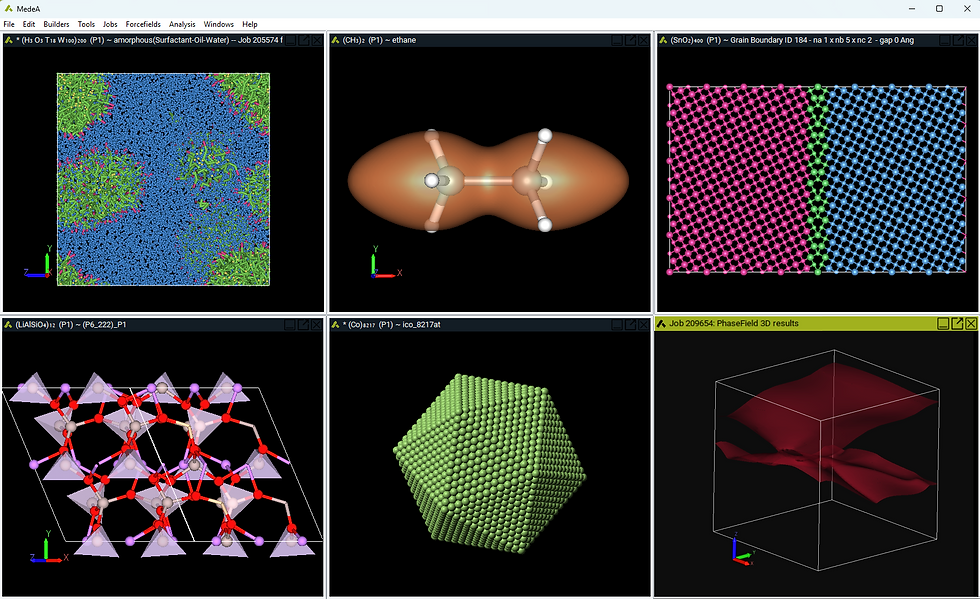MedeA Software Release MedeA 3.7 -- Material Performance!
- Katherine Hollingsworth
- Apr 27, 2023
- 2 min read
Updated: May 3, 2023

Materials Design Announces the Release of MedeA 3.7, Material Performance!
Materials Design announces the release of MedeA 3.7 the latest edition of the world's leading materials simulation environment. The MedeA 3.7 Environment enables scientists and engineers to solve problems using atomistic and mesoscale simulation.
MedeA 3.7 includes new functionality to access the vibrational and thermodynamic properties of complex systems and a broad array of infrastructure enhancements. Additional components of the release are full support of VASP 6.4.1, the latest version of this leading program, providing innovative machine learning updates for high accuracy, high efficiency simulations of complex systems.
"We established Materials Design to provide access to the very best scientific and engineering methods" said Dr. Erich Wimmer, Chief Scientific Officer and Chairman of the Board at Materials Design. "The latest release of the company's software product, MedeA 3.7, provides more technology, intuitiveness, responsiveness, and performance than we have ever delivered before. We employ the MedeA Environment in every Contract Research project, thus ensuring that MedeA is tested and optimized for solving challenging industrial and fundamental research problems. It is always fascinating to experience the power of the unprecedented capabilities of today’s computational materials science methods. We are excited to share this experience with the thousands of MedeA users worldwide by providing this new release. Its science leads us to deep materials insights, its efficiency saves us precious time, and most importantly, its intuitive interface enables us to solve critical problems."
About the MedeA Atomistic Modeling and Simulation Environment
Scientists and engineers in industry, academia, and research institutions employ the MedeA Environment to simulate materials properties and understand diverse phenomena. The MedeA Environment enables users to create better products through the accurate simulation of materials properties and detailed understanding of key mechanisms.
The MedeA Environment integrates world-leading structural databases (totalling over 1,000,000 entries), electronic structure programs (VASP, Gaussian, MOPAC), molecular dynamics (LAMMPS), and Monte Carlo methods (GIBBS) and a host of powerful building, editing, and analysis tools in a unified infrastructure allowing the creation of efficient workflows. Its innovative high-throughput (HT) capabilities enable the exploitation of computational resources to explore complex design spaces.
About Materials Design
Materials Design serves users in academia, government laboratories, and industrial enterprises throughout the world. Materials Design develops the MedeA software environment for electronic structure analysis, atomistic and mesoscale simulation, and materials property data handling, and offers contract research and development, software user training, and scientific consulting services. From energy and transportation to chemistry, microelectronics, clean-tech, and aerospace, Materials Design serves customers who have a wide range of interests and materials challenges.
MedeA 3.7 April 2023
Description of MedeA 3.7 New Features and Enhancements
The MedeA 3.7.0 release provides new capabilities for vibrational analysis based on molecular dynamics trajectories, updated VASP executables (6.4.1) with full integrated MedeA support, extensive enhancements in Machine Learning based simulation, and a broad array of general improvements to the entire MedeA Environment.
An overview of updates in this MedeA release is provided below.
#mesoscale #machinelearning #modeling #materialscience #VASP #LAMMPS #GIBBS #softwarerelease #compchem #flowcharts #machinelearning #VASP6 #MLP #GPU #Computeengines #Propertymodules #mesoscale #timescale #forcefield #batteries #MedeA



Comments